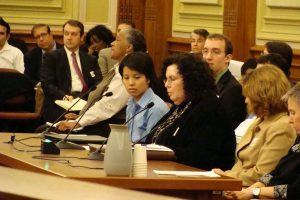DOJ Seeks Dismissal of Lawsuit Challenging FOSTA
 WASHINGTON – Arguing that the plaintiffs lack standing to bring a pre-enforcement challenge and “cannot demonstrate a substantial likelihood of success because they have failed to set forth any claims upon which relief can be granted,” the U.S. Dept of Justice is urging Judge Richard J. Leon to dismiss the lawsuit brought by the Woodhull Freedom Foundation challenging the constitutionality of the Allow States and Victims to Fight Online Sex Trafficking Act (“FOSTA”).
WASHINGTON – Arguing that the plaintiffs lack standing to bring a pre-enforcement challenge and “cannot demonstrate a substantial likelihood of success because they have failed to set forth any claims upon which relief can be granted,” the U.S. Dept of Justice is urging Judge Richard J. Leon to dismiss the lawsuit brought by the Woodhull Freedom Foundation challenging the constitutionality of the Allow States and Victims to Fight Online Sex Trafficking Act (“FOSTA”).
Joined by Human Rights Watch, The Internet Archive, massage therapist Eric Koszyk and Rate That Rescue co-founder Jesse Maley, Woodhull filed a complaint late last month in which the foundation argued FOSTA violates the First and Fifth Amendments, “both on its face and as applied to Plaintiffs.”
In a motion opposing Woodhull’s request for a preliminary injunction against the enforcement of FOSTA and seeking dismissal of the complaint, attorneys for the DOJ asserted the “extraordinary remedy of a preliminary injunction is unwarranted here because this Court lacks jurisdiction.”
“All five named Plaintiffs lack standing to bring this pre-enforcement challenge because the assertions in Plaintiffs’ Complaint fail to establish a credible threat of prosecution based on constitutionally protected activity,” the DOJ wrote in its complaint. “Simply put, the case or controversy requirement of Article III is not met.”
The DOJ also argued that even if the plaintiffs could establish standing, “they cannot demonstrate a substantial likelihood of success because they have failed to set forth any claims upon which relief can be granted.”
Essentially, the DOJ said none of the plaintiffs’ activities are prohibited under FOSTA, and only under an incorrect reading of the statute could one argue it applies to Woodhull or the other plaintiffs in the case.
“The courses of conduct alleged to be planned by the Plaintiffs are not ‘proscribed by [the] statute’ they wish to challenge,’” the DOJ asserted in its motion, citing the case Susan B. Anthony List v. Driehaus (which was quoting the court in Babbitt v. United Farm Workers Nat’l Union.)
Citing the organization’s complaint, the DOJ noted Woodhull describes itself as a nonprofit organization “working full time toward affirming and protecting the fundamental human right to sexual freedom,” and that the Foundation “intends to hold its ninth-annual Sexual Freedom Summit in August.”
“By its own admission, Woodhull is proceeding with its Summit, including online advertising,” the DOJ observed in its motion to dismiss. “As described by Plaintiffs, none of these activities would subject someone to liability under 18 U.S.C. § 2421A, or any provision of FOSTA.”
The DOJ’s motion also compared “enforcement history of substantially similar crimes” to those covered by FOSTA, claiming the examples provided “illustrate the inapplicability of FOSTA to these Plaintiffs.”
“Advocating for the legalization of sex work, for example, is the opposite of the intentional facilitation of illegal prostitution,” the DOJ argued. “Helping sex workers find appropriate service providers no more facilitates prostitution than rehabilitation services facilitate drug trafficking. Discussing ‘harm reductions, disability, age, health and personal safety’ is not promoting or facilitating prostitution.”
Among all five of them, the DOJ argued none of the plaintiffs have “alleged an intention to engage in a course of conduct arguably affected with a constitutional interest but proscribed by FOSTA, and have not demonstrated that a credible threat of prosecution under the Act actually exists.”
In other words, the DOJ argued, the only threat of prosecution under FOSTA to the plaintiffs is one which exists in their own imaginations, fostered by a misreading of the law.
“This is not a case where FOSTA, by its own terms, prohibits Plaintiffs’ constitutionally-protected speech,” the DOJ argued. “Plaintiffs misconstrue the statutory provisions at issue and, in fact, the promotion or facilitation of illegal prostitution would not qualify as protected speech.”
Accordingly, the DOJ asserted the plaintiff’s “claims that their present activities are chilled” amounts to “nothing more than self-inflicted injury and fail to establish irreparable harm for the same reasons they are insufficient to establish an injury-in-fact.”
A hearing on Woodhull’s preliminary injunction request is scheduled for 4pm, Thursday July 19.













